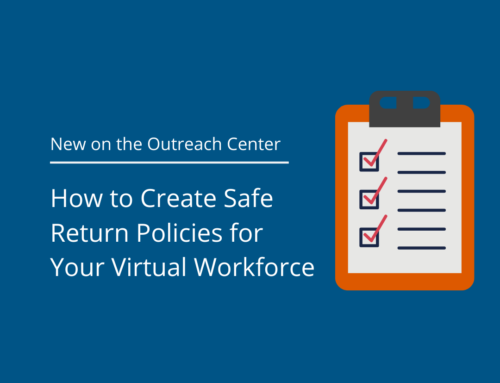Over the past few weeks, we’ve tackled the hairball that is working from home. We’ve talked about setting schedules and staying focused, designing a workspace conducive to productivity, communication strategies and maintaining sanity through it all. But a key thing to making this all work, is trust.
Today’s Focus: Building and Having Trust in a Virtual Office
Trust is one of the biggest challenges in a virtual office. Employers have to trust that their employees are being productive and not spending all day playing fetch with their dogs. Employees have to trust that their bosses know they’re working, without putting in crazy hours to prove it. Employees also have to trust each other since so much of what we do is shared work. So how do we build trust?
The Check-In
Those of us new to working from home soon become painfully aware of the “Check-In”. The boss is calling 12 times a day, there is a never-ending stream of virtual meetings and your fingers are tired from the constant use of chat.
Be patient. Remember, this virtual world is new to many and it takes time to learn to navigate it. As we build trust in our team, check-ins will become more about productivity and less about needing to be in constant contact to ensure people are working.
Know Your Team
In a typical office, when we arrive early to a meeting, we chat with Joe about his kid’s softball team or with Susie about her 14 cats. It’s important when working remotely to engage in the same types of activities. Arrive a few minutes early to a virtual meeting to catch up on Joe Jr.’s most recent homerun or send Susie a few funny cat GIFs. Trust comes from knowing people.
Listen
Human tendency is to talk. To share with the boss everything you’ve done so she knows you are working hard. To tell your coworker about the progress you’ve made on the presentation to show you’re on top of things. What we aren’t as good at is listening.
Strive to simply listen. Once the person is completely done speaking, you can repeat things back to ensure understanding, but then take time to fully process and consider what you’ve heard before offering back your thoughts. It’s completely acceptable to say something like, “Wow, Judy, those are great ideas. You’ve given me a lot to think about. Is it okay if I take some time to process and get back with you?”
Transparency
Yes, we are all sick to death of this word. But it’s a cliché for a reason. Being open and upfront with your coworkers helps to build trust. Let your boss know the status of an assignment before he contacts you. Provide updates to your coworkers on tasks and be upfront about asking for help. Consider storing your notes for a project in a shared location, rather than keeping them to yourself for fear others might steal your ideas. Small steps taken to show trust help to build trust.
Consistency and Accountability
Being consistent shows your team that you are dependable. Keep your output high quality and timely and be accountable for your tasks and work product. As leaders, set consistent expectations and adhere to them.
- Don’t ignore “exceptions”
Let’s face it, right now consistency can be difficult. It is just not realistic to have the exact same expectations relating to hours and availability from Gerry, who is also juggling homeschooling three children, as it is from Lucy, whose only distraction at home is her dog. That’s not to say Gerry doesn’t still have a job to do. Gerry, like everyone else on the team, is still accountable, but perhaps work with him and the team to establish a new “normal” during this unusual time.
Transparency here can help. If “elephants” are ignored, trust will be eroded. If Lucy perceives she’s putting in more time, her bitterness will wear at her working relationship with Gerry. Acknowledge complications with your team and explain how they’re being managed.
Focus on Production
As more companies embrace the virtual office model, many are finding that is it not the traditional idea of hours in a chair that matters so much as what is produced. True, some positions still require set hours and you don’t ever want to hamper progress by having team members not available to each other. However, if it doesn’t matter what time of day the TPS Report is done, consider letting the people responsible for its creation set their own hours. Employers and employees alike will quickly be able to tell who is pulling their weight and who isn’t, which generally leads to people stepping up their games.
Provide and Seek Feedback
If you’re a manager, let your team members know their work is valued. Give a shout out when it’s earned and ask for regular input from the team. As an employee, let your manager know if you’re struggling or missing the tools you need to be successful and be open to suggestions.
Build Trust on Shared Foundations
Trust is built on shared goals. When we know we are all in it together and are rowing to the same shore, it’s easier to trust each other to do what it takes to get there. Spend the time to review what it is you are working towards and why that is important to the company, as well as to each team member. Consider printing your company values so you see them every day or begin each workday reflecting on how your tasks for that day contribute to the bigger picture.
Invest Now to Build Trust
While it’s true we can’t gather right now for a company retreat filled with icebreaker games and trust falls, we can still take steps to establish trust with our teams. Dedicate the time and resources now so that you and your team are more successful in the future.





